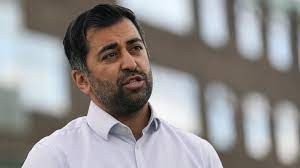
Junior doctor strikes will lead to “major disruption” for Scotland’s NHS, Humza Yousaf has said.
The first minister, who spoke after chairing a meeting of ministers and health officials to plan contingencies, warned surgeries would be cancelled.
Junior doctors are set to strike between 12 and 15 July after rejecting a 14.5% pay rise over two years.
The British Medical Association (BMA) said the action was an “absolute last resort”.
Dr Chris Smith, the chair of the BMA’s Scottish junior doctors committee, added those expected to walk out between Wednesday and Saturday next week were “standing up for the future of the NHS”.
Mr Yousaf said he will attend negotiations on Tuesday in a bid to avoid industrial action.
“I am prepared to offer our junior doctors a deal that hasn’t been seen in the history of devolution,” he said.
“We’ll do everything we can to avoid industrial action. I’m hoping junior doctors will see that offer as a good one.”
Mr Yousaf said the offer would put “thousands of pounds more in the pockets of junior doctors”, as well as helping to address concerns over working conditions.
On Monday, the first minister convened the the Scottish Government Resilience Room (SGoRR) – the equivalent of the UK Cobra committee – to plan for a possible strike.
“I’ll be upfront, we can put in place as much mitigation as we can, but I’m afraid if there is a junior doctors strike the impact will be very significant indeed,” he said.
“We’re talking about tens of thousands of cancellations of appointments.”
Deputy First Minister Shona Robison, Health Secretary Michael Matheson, chief medical officer Dr Sir Gregor Smith and NHS officials also attended the SGoRR meeting.
Dr Chris Smith said: “Junior doctors in Scotland have consistently and strongly made clear that the pay offers made so far by the Scottish government are not yet sufficient to demonstrate a commitment to reverse the years of pay erosion we have suffered, which has seen pay reduced by 28.5% since 2008.”
He added: “Unless we act now and invest in the future of the workforce, we will go on losing doctors to places they are valued properly, compromising the care we can provide to the people of Scotland now and in the future.
“It is on that basis we have reluctantly been pushed to announce strike dates for later this month – and in doing so we gave extra time for health boards and the Scottish government to prepare.”
‘Breaking point’
Mr Yousaf also visited NHS Forth Valley to mark the 75th anniversary of the founding of the NHS.
He announced that a further investment of £9m in the Transforming Cancer Care Programme – a partnership to support cancer patients and their families
Labour’s social justice, social security and justice spokesperson Paul O’Kane had urged the first minister to get off the “sidelines” and engage directly in the pay negotiations.
“What we are seeing across the piece is that people can’t be retained within the system, there’s no incentive for them to stay and they’re at breaking point,” he told BBC Scotland.
“They’re burned out, they’re feeling stressed and they are not getting the support they need.”
The BMA has called for a 23.5% pay increase for Junior doctors – fully-qualified medics who are not specialty staff doctors, consultants or GPs. They make up 44% of the doctors in the NHS in Scotland.
They had originally voted to take strike action in May, before a fresh pay offer was made by the government a few weeks later.
As junior doctors prepared to strike, a Scottish minster urged the UK government to scrap its “disgraceful, abhorrent” plans for controversial strike reforms.
Wellbeing Economy minister Neil Gray wrote to Business Minister Kevin Hollinrake ahead of the Strikes (Minimum Service Levels) Bill returning to the House of Lords next week for further consideration.
The bill would give ministers the power to impose minimum service levels for health, fire, education and transport services, as well as border security and nuclear decommissioning.
Mr Gray reiterated the Scottish government’s opposition to the proposals, adding that he was “further appalled” that amendments which would restrict the bill to cover only England were rejected last week.
First Minister Humza Yousaf has said he would not impose such minimum restrictions in Scotland, and has claimed the bill encroaches on devolved areas.
The UK government has said the bill will “ensure crucial public services such as rail, ambulances, and fire services maintain a minimum service during industrial action, reducing risk to life and ensuring the public can still get to work”.
Source – BBC News


Share your thoughts